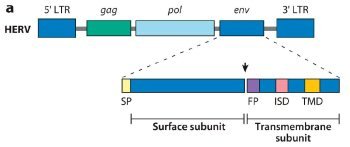Natalizumab modulates the humoral response against HERV-Wenv73-88 in a follow-up study of Multiple Sclerosis patients.
Arru G, Caggiu E, Leoni S, Mameli G, Pugliatti M, Sechi GP, Sechi LA. J Neurol Sci. 2015. pii: S0022-510X(15)00428-1
Multiple Sclerosis (MS) is a heterogeneous disorder of the central nervous system (CNS) that begins as an inflammatory autoimmune disorder mediated by auto-reactive lymphocyte followed by microglial activation and chronic degeneration. The aetiology of Multiple Sclerosis (MS) is unknown but several data support the hypothesis of possible infectious agents which may act as a trigger for the pathogenic cascade. Human endogenous retrovirus (HERV-W/MSRV), Epstein Barr Virus (EBV) and Mycobacterium avium ss. paratuberculosis (MAP) have been associated to Multiple Sclerosis. In this study, we evaluated the humoral response against different peptides: the human endogenous retrovirus HERV-Wenv73-88, MAP106c121-132 from MAP, EBNA1 400-413 from EBV and the homologous human peptide MBP85-98 in a cohort of MS patients treated with natalizumab. Results showed a statistically significant difference in the response against the HERV-W peptide in MS patients after two years of natalizumab treatment.
Natalizumab inhibits relapsing MS and traps cells in the blood. So why would this be associated with less of a response to endogenous virus.
The Gs have made an idea that such endogenous virus could drive MS and so get rid of them and MS goes away. After 2 years of natalizumab there is less activity against endogenous virus. So is the endogenous virus activity a product of MS activity get rid of this there is lack of HERV expression and so there is nothing to drive a persistent antibody response. But if this is the case is HERV a consequence rather than a cause.
